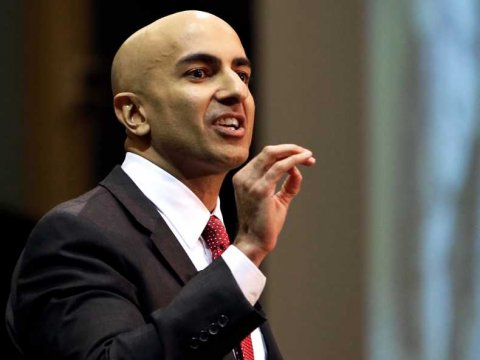Neel Kashkari, one of the Republican candidates for Governor of California, published a new blueprint for the state’s education system Tuesday. The focus is on making public schools in the state operate more like charter schools.
Currently California ranks near the bottom of the 50 states on some metrics of school achievement. For instance, California’s K-12 graduation rate is around 80 percent, which placed it in 48th place in 2011. California also ranks 46th in both math and reading scores.
The Kashkari paper isn’t shy about framing this as a partisan problem, saying: “Every child deserves a good education…yet Democrats refuse to prioritize children over the interests that fund their political machines.”
The paper also highlights an achievement gap between charter schools (79% graduation rate) and public schools (66%). It cites a Stanford study which found that “the typical student in a Los Angeles charter school gains more learning in a year than his or her LAUSD peer, ‘amounting to about 50 more days of learning in reading and an additional 79 days of learning in math.'” The solution Kashkari sees for California students is to treat public schools more like charter schools.
Kaskshari’s does give some credit to Governor Jerry Brown’s reforms aimed at shifting school spending away from Sacramento, but he presents those as a half-measure that still leaves too many public school bureaucrats in the loop. His solution is to send money directly to schools, bypassing school districts and their overhead.
One result of this change would be to give principals more say in how their budgets are spent, including in payroll. That would open the possibility of paying teachers based on performance reviews rather than tenure. The payroll scale for California teachers would become something more like a guaranteed minimum, but outstanding teachers could earn more.
Other K-12 recommendations made by the Kashkari campaign include an increase in the number of days of schooling and granting public schools the same waiver from the California Education Code that charter schools now receive.
The proposal also contains a section on higher education. Proposals include mandating that 20 percent of classes be available online withing four years. The proposal also suggests a system of free tuition such as one being pioneered in Oregon. There, students receive free tuition in exchange for a small percentage of their future earnings–for example, 3% of earnings for 24 years. Kashkari recommends the same program should be offered to science and technology students in California, though his proposal doesn’t specify the rate and duration of the payments.
Given that this is a political document, it’s not entirely surprising that the Kashkari campaign frames the need for these changes to the education system more broadly. The first four pages of the paper are devoted to a critical assessment of Democratic policies aimed at reducing income inequality. It describes a “quiet war against minority children” being waged by Democrats, citing recent moves by New York Mayor Bill de Blasio and Attorney General Eric Holder. The paper sums up this critique saying: “income inequality is the product of a growing economy and a failed education system.”
The California primary takes place on June 3rd. The top two finishers will then compete against one another in the November election. A recent Field poll puts Kashkari in third place behind Republican Tim Donnelly.

COMMENTS
Please let us know if you're having issues with commenting.